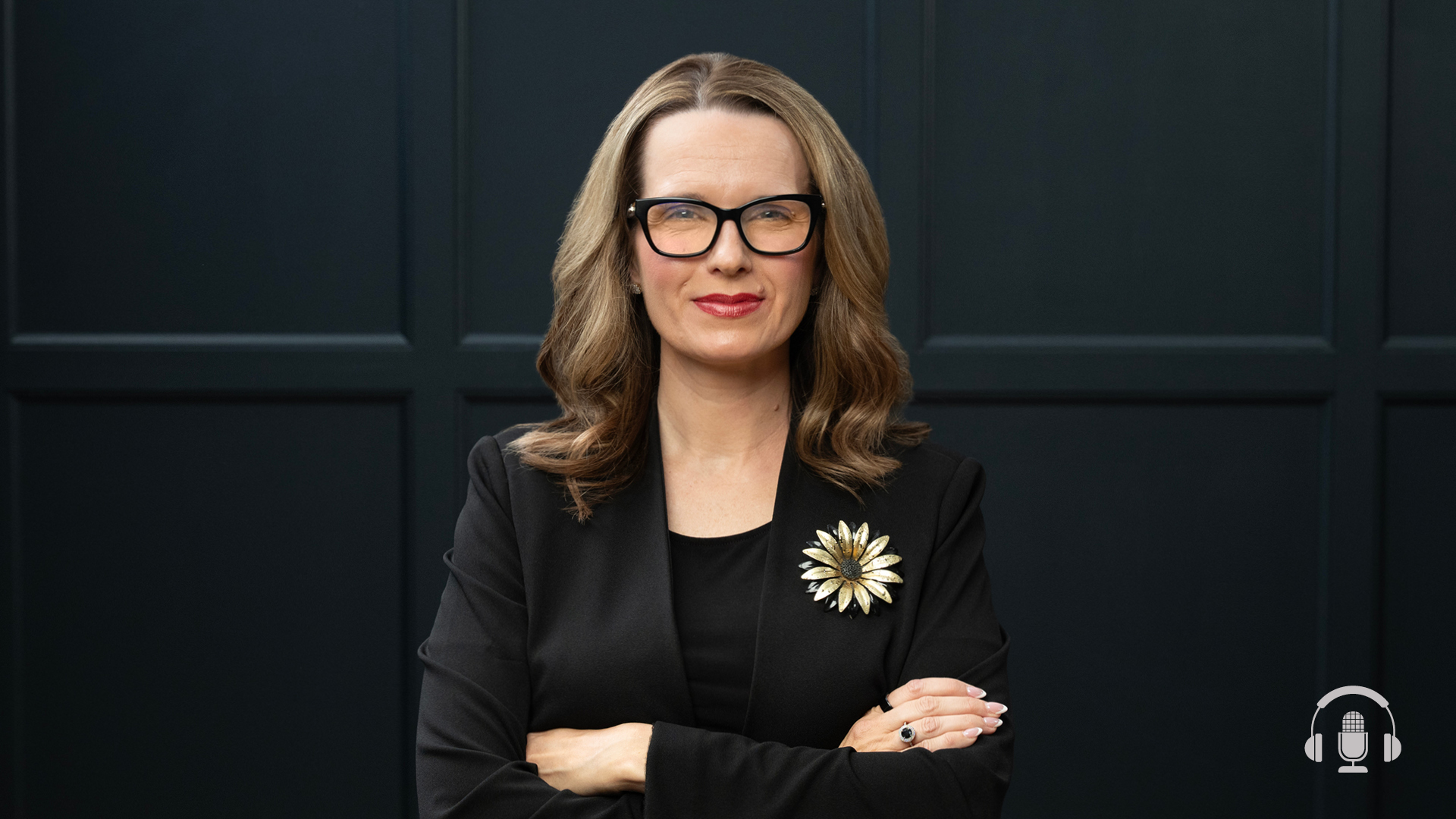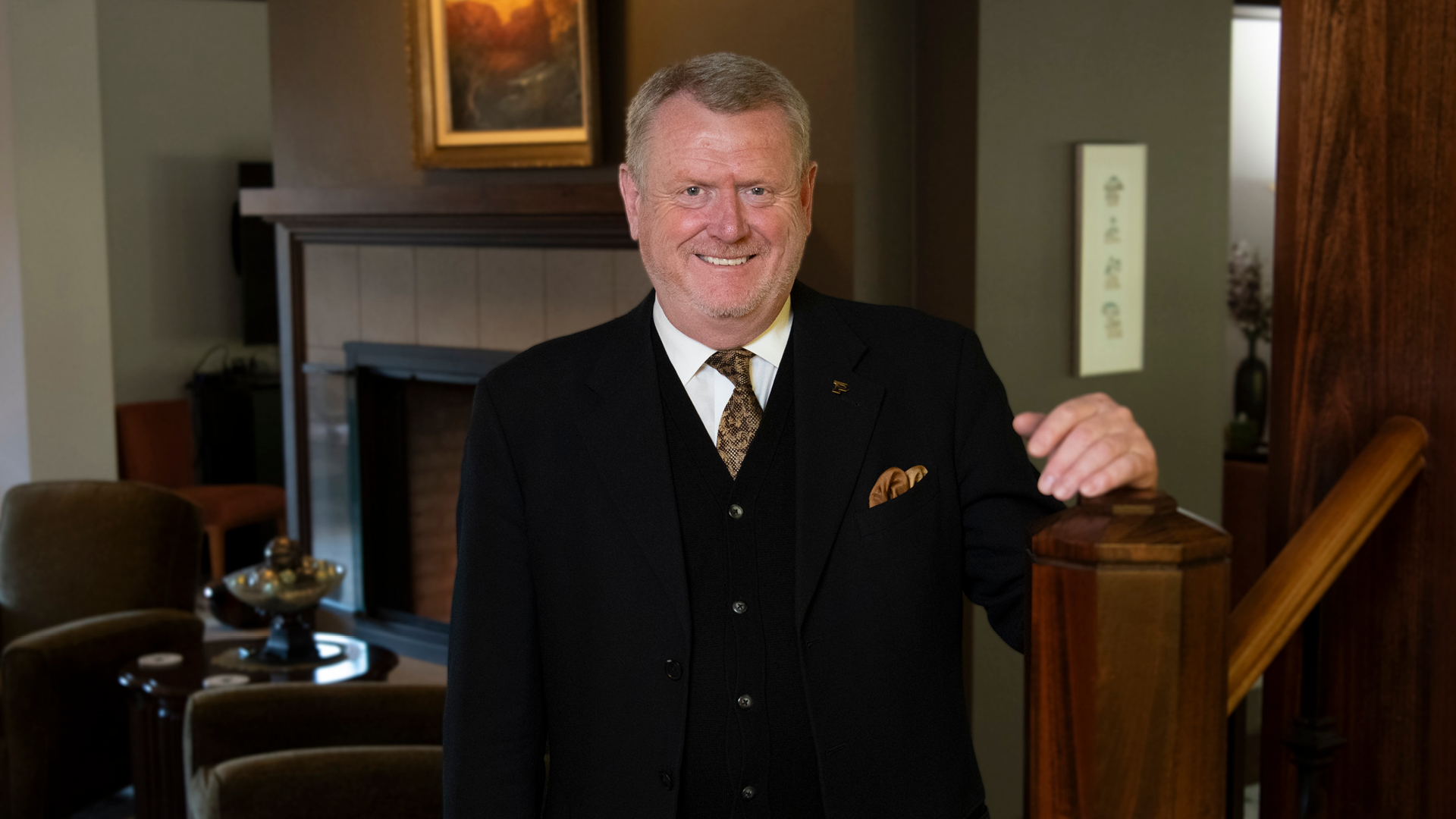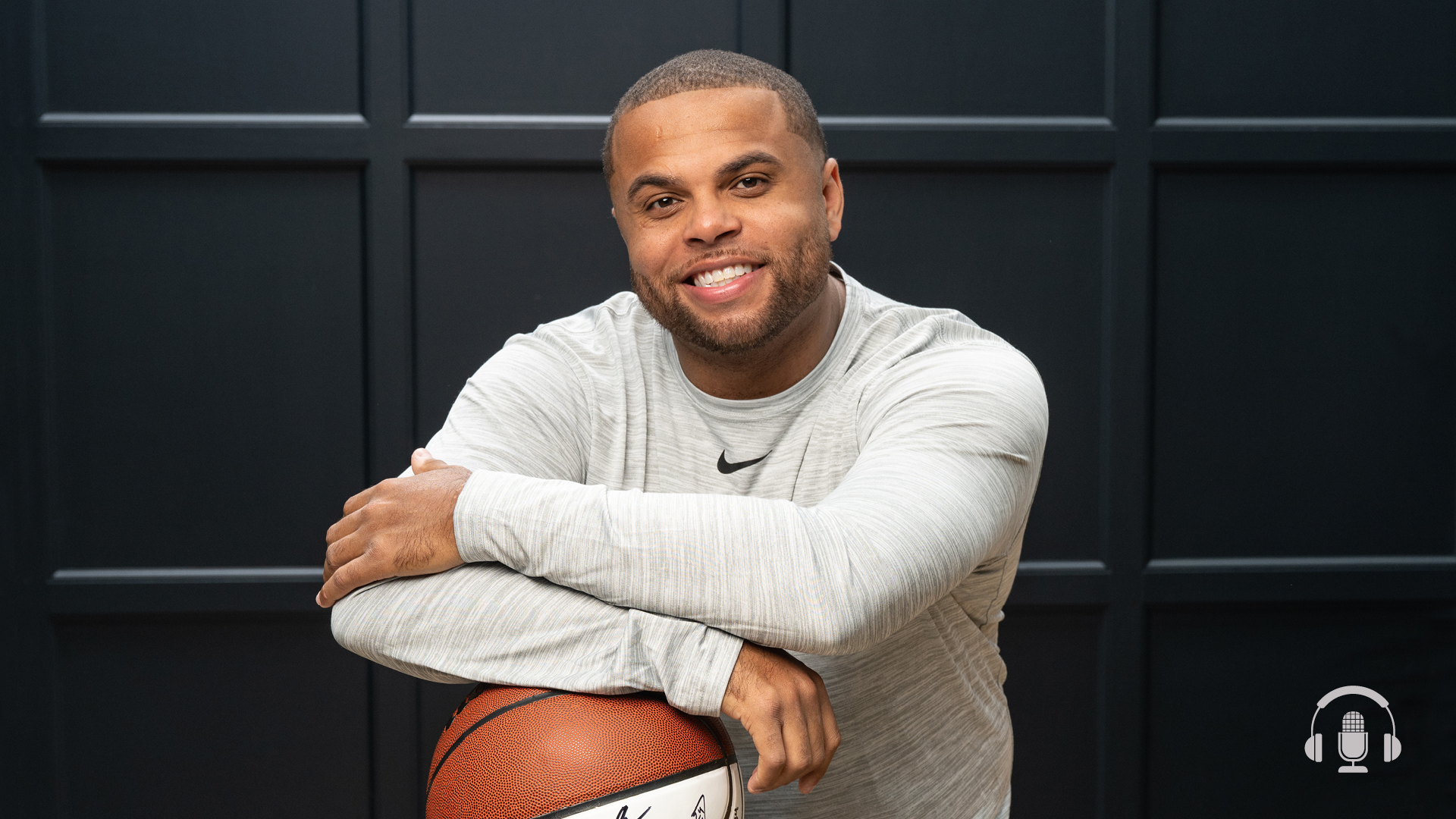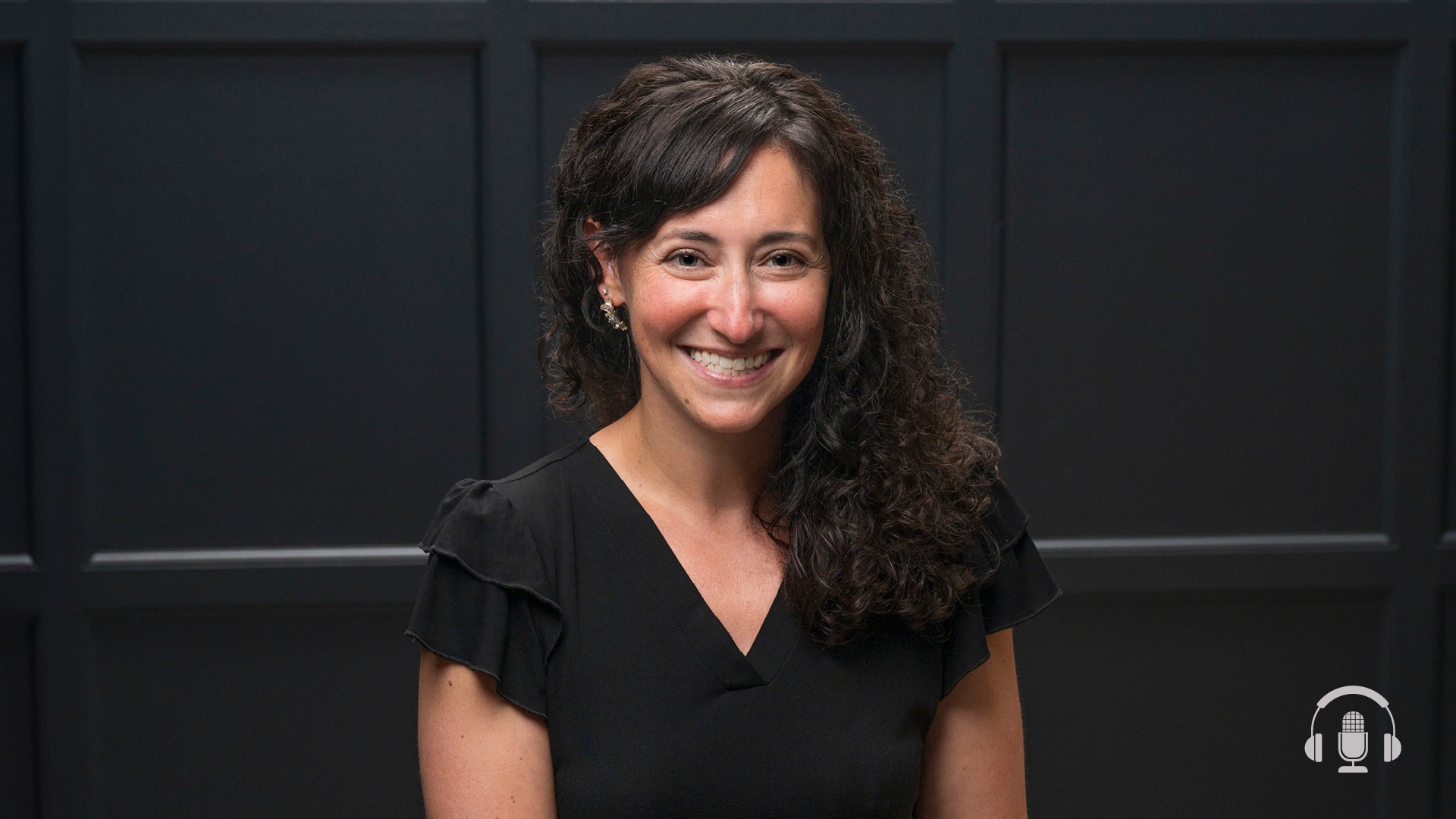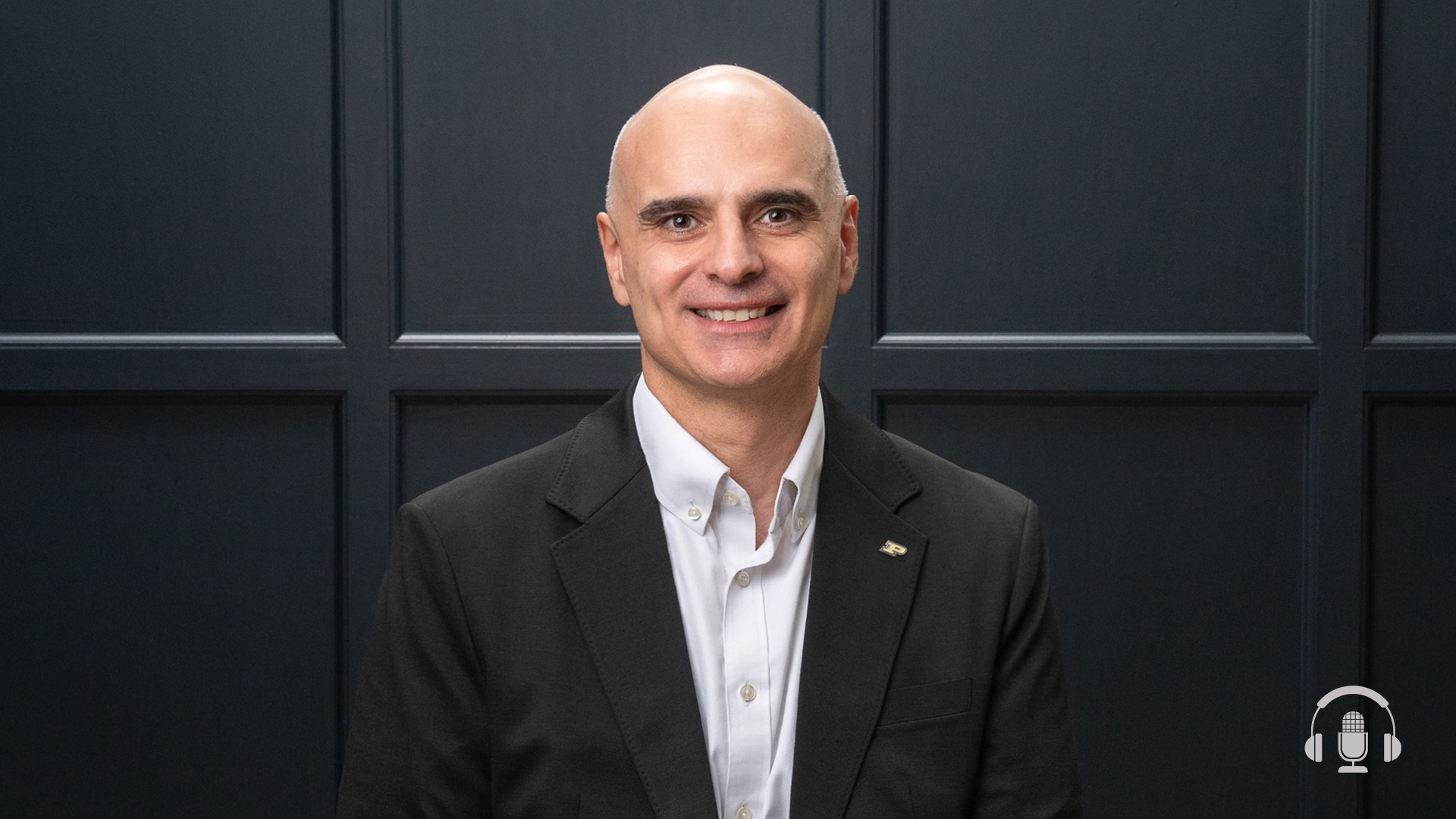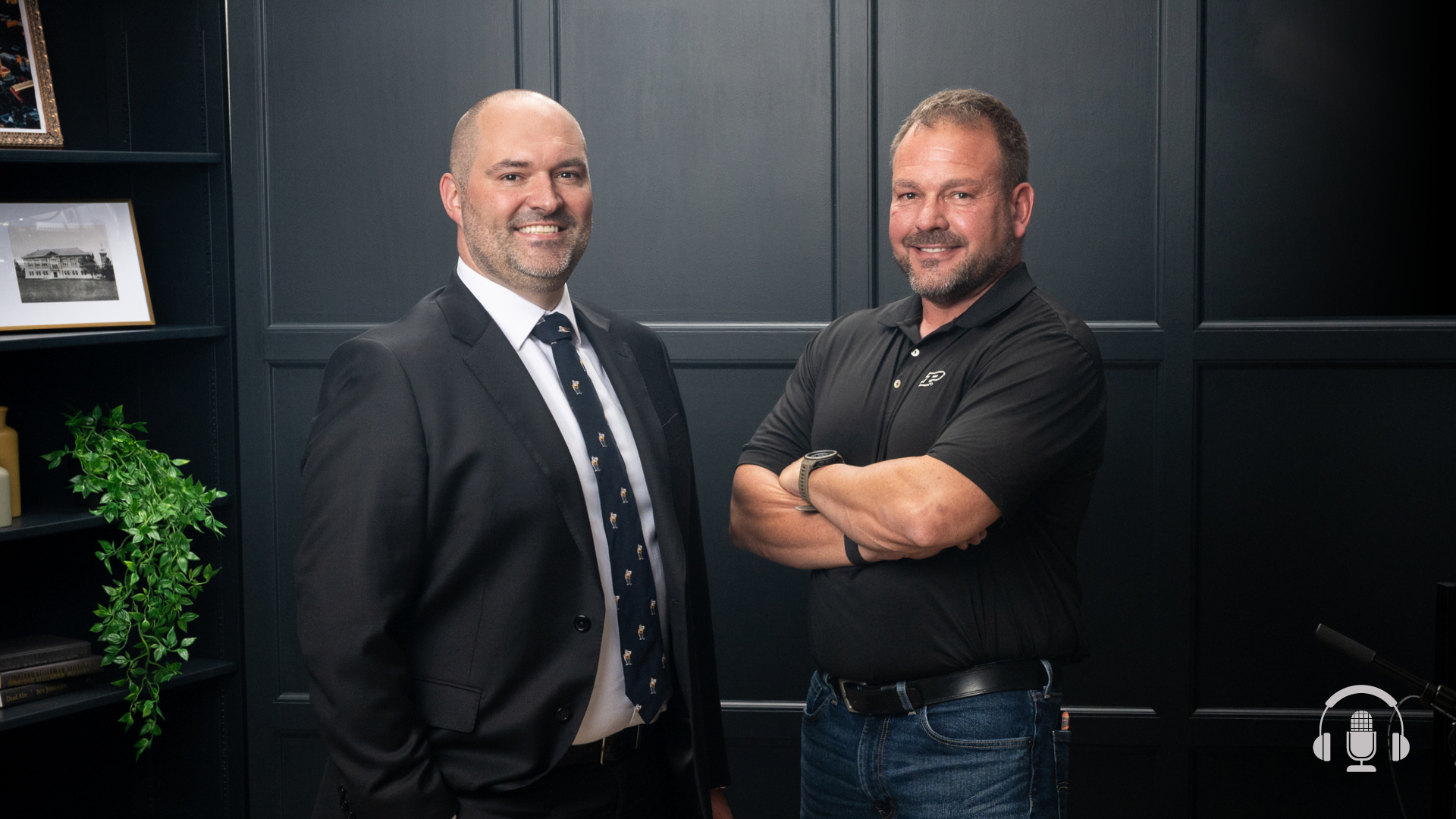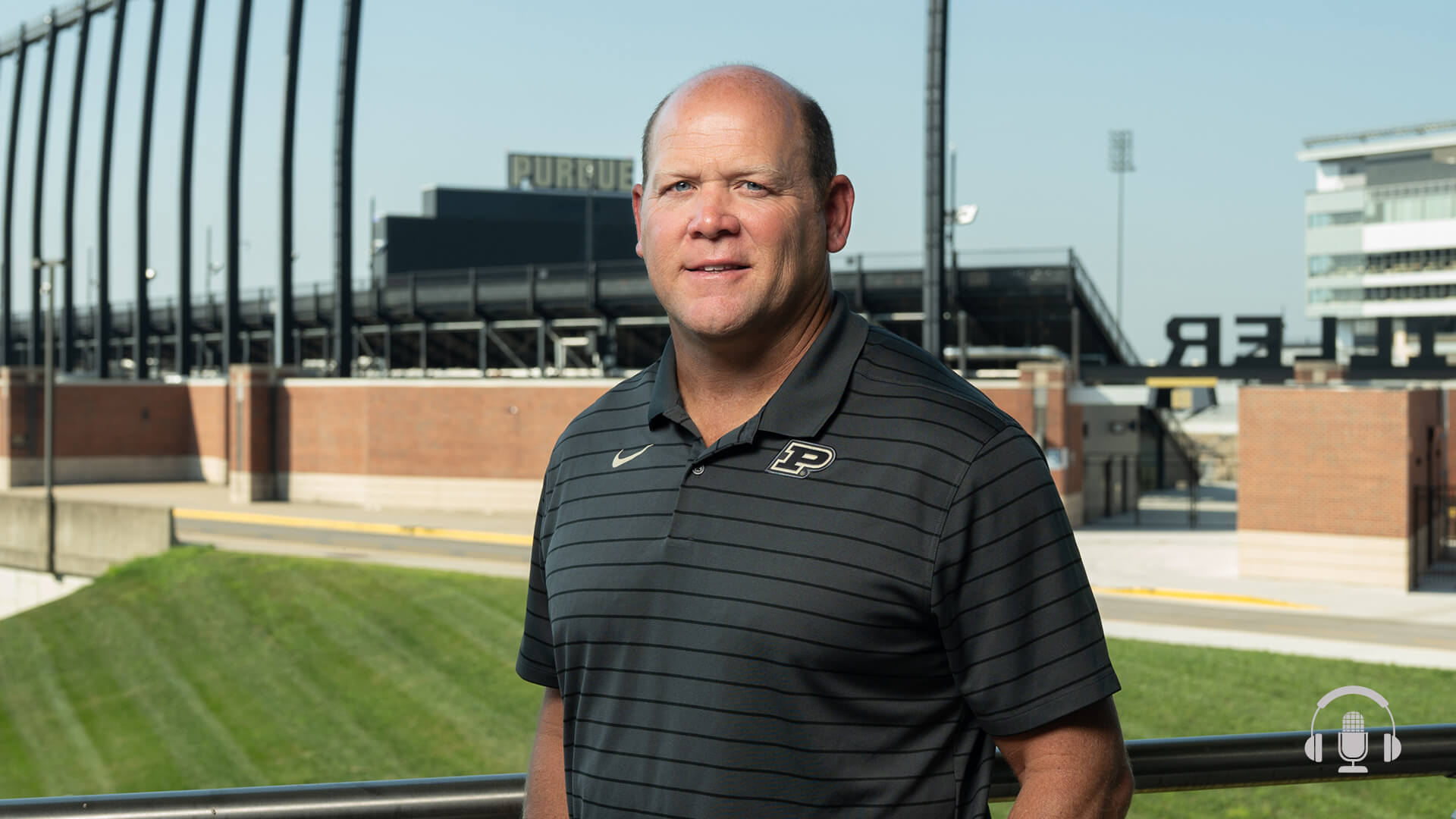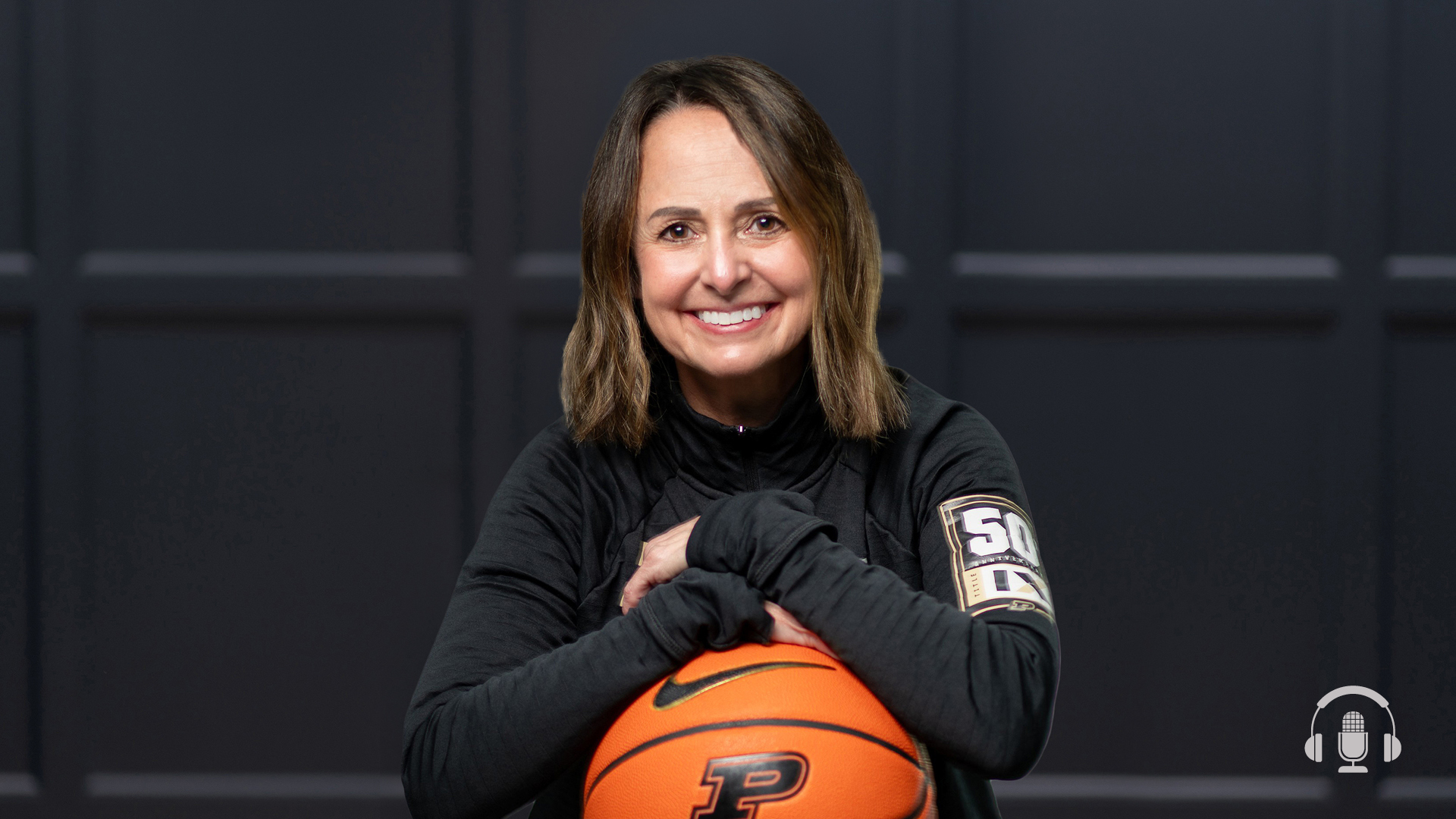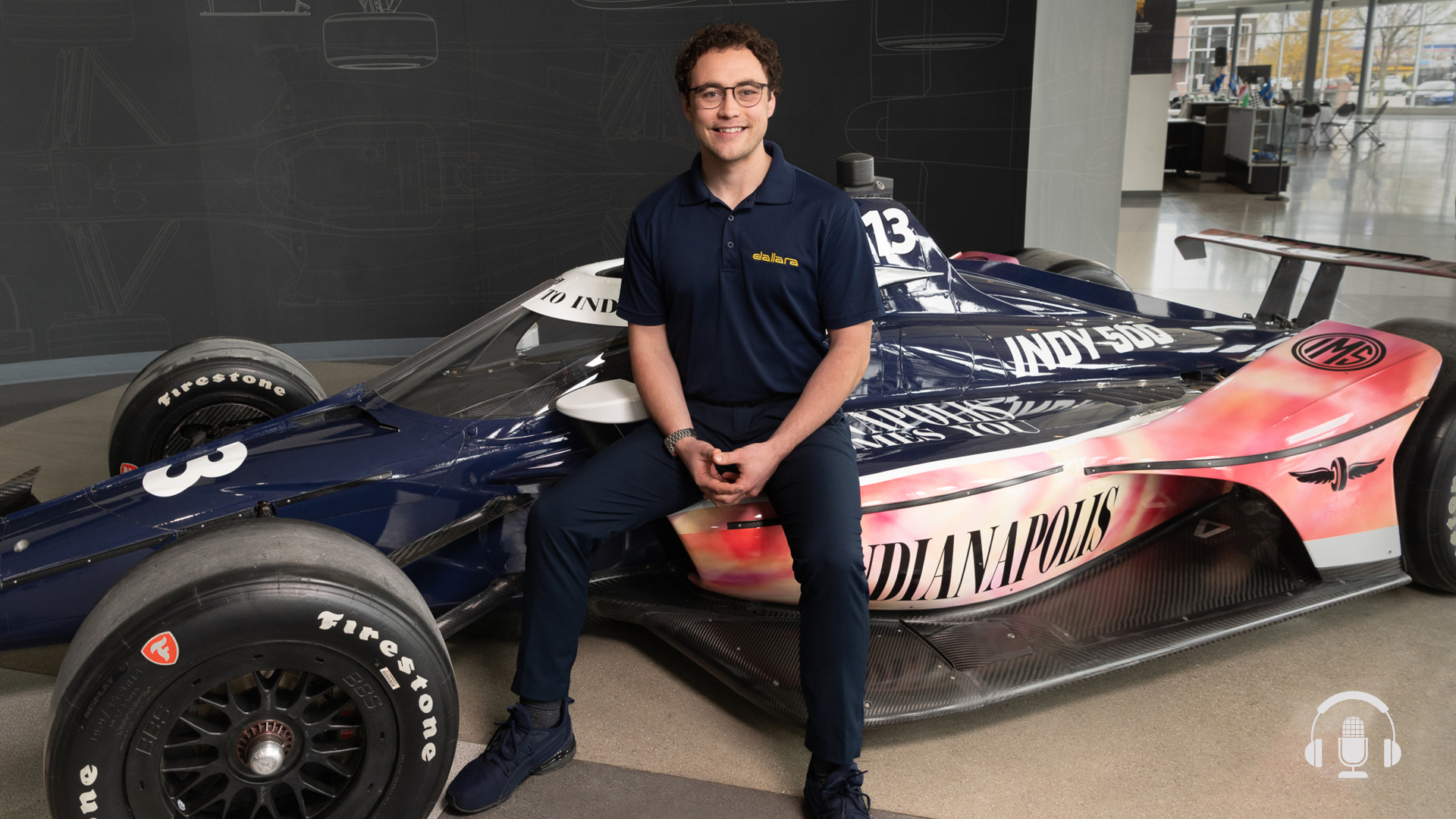Podcast Ep. 135: Breaking News Producer on the Evolution of the Media Industry
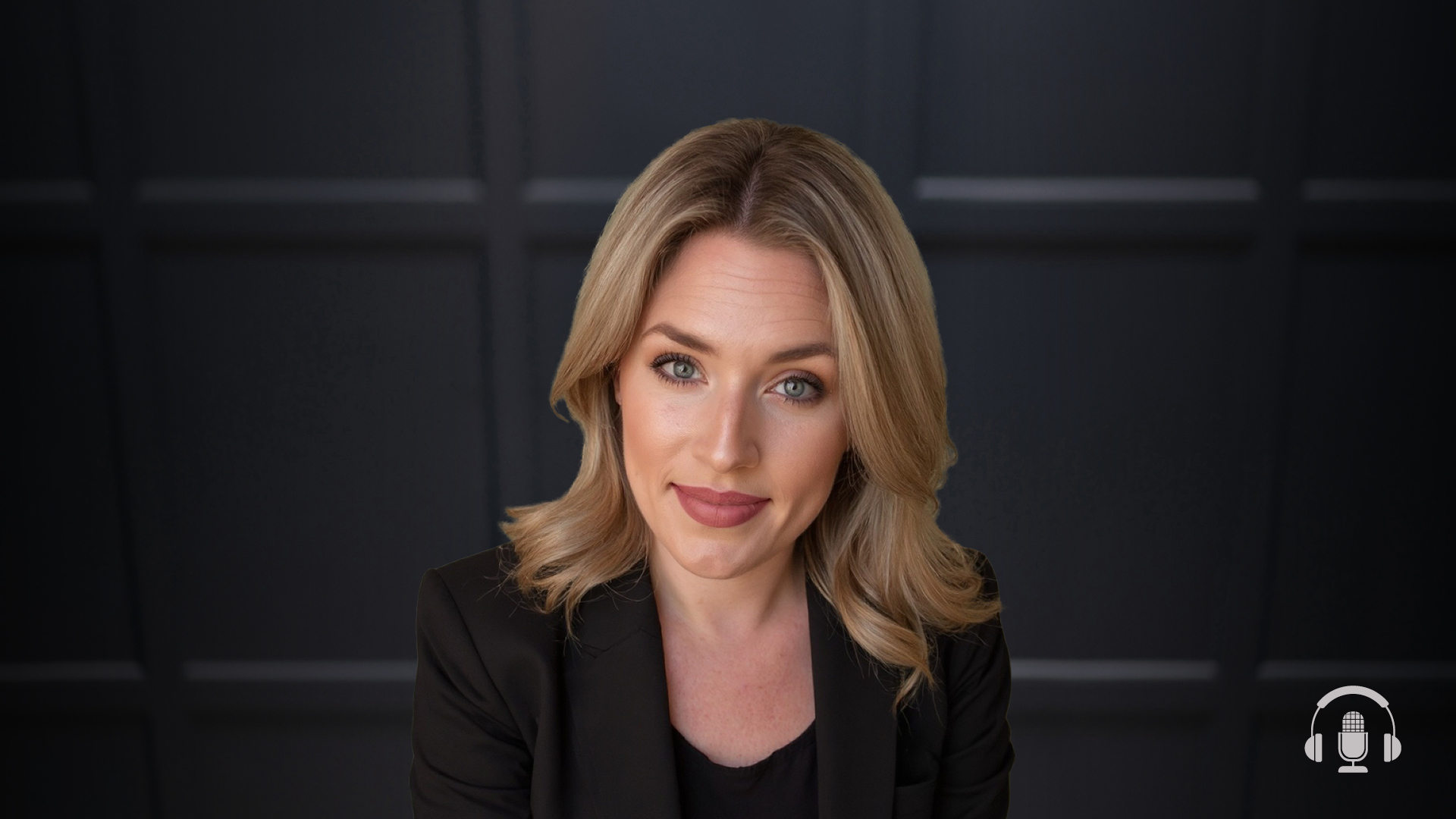
In this episode of “This Is Purdue,” we’re talking to Sutton Tyson, producer for CBS News.
As a proud Purdue College of Liberal Arts alumna, Sutton is a rising talent in the broadcast journalism field. She’s currently the booking producer for “The Takeout With Major Garrett” and previously served as spokeswoman in the FBI National Press Office, covering national security, criminal activity and counterintelligence issues. And through these roles, she’s gained expert insights into a rapidly evolving media industry.
In this episode, you will:
- Learn how traditional news networks are tailoring their content strategies to meet various demographics, like Gen Z, where they are leveraging streaming, podcasts and social media
- Find out more about Sutton’s journey from Purdue to working for the FBI National Press Office in Washington, D.C., where she learned how to work under pressure and communicate effectively during crisis events
- Hear what it’s like to be a producer for a major network like CBS News — including engaging with high-profile guests and covering breaking news in a 24-hour cycle, like the U.S. Army Sikorsky UH-60 Black Hawk helicopter collision over the Potomac River
- Explore Sutton’s advice for prioritizing mental health, well-being and work-life balance, especially when working in the news industry
- Discover the foundational skills she learned while studying communication at Purdue, like cultivating meaningful relationships to set herself up for career success
Don’t miss this engaging, informative episode with a Boilermaker who’s helping shape the vital news and content we consume on air and online!
- Learn more about Sutton Tyson
- Learn more about CBS News
- Learn more about “The Takeout With Major Garrett”
- Learn more about the Federal Bureau of Investigation
- Learn more about the FBI National Press Office
- Learn more about the Purdue College of Liberal Arts
- Learn more Purdue’s undergraduate degree in communication
Podcast Transcript
Kate Young: Hi, I’m Kate Young, and you’re listening to This Is Purdue, the official podcast for Purdue University. As a Purdue alum and Indiana native, I know firsthand about the family of students and professors who are in it together, persistently pursuing and relentlessly rethinking, who are the next game changers, difference makers, ceiling breakers, innovators? Who are these Boilermakers? Join me as we feature students, faculty, and alumni, taking small steps towards their giant leaps and inspiring others to do the same.
Sutton Tyson: We’re very used to the five o’clock evening news where you sit down and you have that hour-long packaged segments type of news programming. Streaming functions very differently in that it’s on-demand. You can access it at any time, whether it’s airing live or whenever you’re able to watch. There’s device flexibility. It’s not just being cast from your television. You can watch it on your phone, watch it on your laptop. There’s a variety of ways in which you can access this news content that didn’t use to exist.
Kate Young: In this episode of This Is Purdue, we’re talking to Purdue College of Liberal Arts alumna Sutton Tyson. Sutton is a rising talent in the broadcast journalism field and is currently the booking producer for The Takeout with Major Garrett on CBS News. She also previously served as the spokeswoman in the National Press Office for the FBI, where she covered issues of national security, criminal activity, and counterintelligence. As the rise of social media continues to grow and less people are sitting down to watch the 5:00 p.m. news on their TVs, Sutton shares what she believes the future of the news holds, especially for younger generations. Plus, we discuss her incredible career journey in Washington DC and her firsthand experiences in the rapidly evolving news industry. Okay, let’s get to it. Here’s my conversation with Sutton. Sutton, thank you so much for joining us on This Is Purdue, Purdue’s official university podcast. Welcome to the show. Thanks for coming.
Sutton Tyson: Thank you. Thank you for having me.
Kate Young: Younger audiences, and a specific generation is on a lot of people’s minds lately, it’s making headlines, it’s Gen Z. You’re someone who works behind the scenes at a major news network, CBS. What is your approach to meeting this demographic where they are?
Sutton Tyson: Gen Z, they’re not the up and coming generation anymore. They’re the ones that we are really speaking to at this point. The biggest thing that stands out to me about their generation is their ability to seek authenticity and transparency. They’re the generation that grew up with influencers and catered content based on whatever their interests are, their passions. So that really does shape from a news standpoint how we’re really re-envisioning delivering the news. How do we give content that meets the demand that is speaking to this authenticity and this transparency and catered to a younger audience? At least for me personally, it’s definitely forced me to re-imagine how we reach that demographic in a way that’s tangible.
Kate Young: They’re used to quick clips. They’re on YouTube. They’re on TikTok. They’re on Instagram. How much do you take that fact into consideration when you’re booking guests and shaping content for The Takeout?
Sutton Tyson: A lot of my consideration when I’m looking to book a guest for our programming, it’s not just who’s going to give the best interview, but who’s going to give content that can function both as a long-form interview and be compelling but can also be a bite-size piece that can go on YouTube, Instagram, TikTok. It’s very multifaceted, I would say, in my thought process in booking. I guess to join us, you’re wanting them to be able to, again, reach this generation on a variety of different platforms.
Kate Young: And have that authenticity, too, I’m sure.
Sutton Tyson: Absolutely.
Kate Young: You believe streaming is the future of news, and that’s something that The Takeout is addressing. So they’re streaming on CBS on the website as well as a podcast. Walk us through streaming. How is streaming different from sitting down and watching the five o’clock news every night?
Sutton Tyson: There’s a variety of ways that streaming differs from your traditional broadcast news. We’re very used to, as you said, the five o’clock evening news where you sit down and you have that hour-long packaged segments type of news programming. Streaming functions very differently in that it’s on-demand. You can access it at any time, whether it’s airing live or four or five, six hours later whenever you’re able to watch. There’s device flexibility. It’s not just being cast from your television set. You can watch it on your phone, watch it on your laptop, access it from a podcast platform. So there’s a variety of ways in which you can access this news content that didn’t use to exist.
Also, I think the streaming format provides a more casual and formal setting, which is neat because it gives the opportunity for us to have more long-form intentional conversations. You’re not seeing those cut down two to three-minute interviews that came from a 30-minute sit down. You can actually capture that entire conversation, air the whole thing on your streaming platform, and then, as I said earlier, cut those down into the bite-sized pieces to put on your social media platforms like the TikToks and the Instagram. So it’s a very different way in which we’re creating and packaging news, but it provides, I would say, vast opportunity in a way that traditional broadcast just doesn’t.
Kate Young: I know, too, with podcasting, we always talk about you can download it and it’s there on a flight, or if you lose WiFi on a road trip, you lose phone service, you can still access it versus sitting in front of the TV like traditional broadcasting.
Sutton Tyson: Yeah, that’s exactly right.
Kate Young: I asked Sutton how she thinks broadcast news and news consumption will change in the next five to 10 years. Does she ever envision cable news going away completely?
Sutton Tyson: I think we’re already seeing this change play out with the iterations of streaming over the past few years. It goes back to this new generation, these up-and-coming generations that are seeking the content that they want. Do I think that that will completely rid us of traditional broadcasts altogether? I doubt it, but the way in which we are providing news is going to constantly evolve. Again, it’s why I find streaming to be such a unique platform for us to really think outside the box, be creative, and not just reach the younger generations, but reach all the generations based on the content that they’re choosing to consume.
Kate Young: Sutton reflects on the potential challenges that traditional news networks have to navigate now that streaming is growing in popularity.
Sutton Tyson: Traditionally, broadcast news, as it currently stands, its target demographic is just a much older age range than what you might see with a streaming audience. So I think in that sense, crafting the messaging so that it’s resonating with the audience that is tuning in, it’s really important. That’s something where, when it comes to the streaming networks, the streaming shows and segments that we have, it’s a bit more diverse in the sense of the age demographic ranges from young to old. You have more flexibility in your messaging and your strategy.
Kate Young: Let’s go back to your career path, your Purdue journey. You graduated from Purdue’s College of Liberal Arts with a bachelor’s degree in mass communications and then a minor in political science. Then you moved to DC, you said, right after graduation.
Sutton Tyson: Yeah, I graduated and moved the next week.
Kate Young: That is so cool. You worked in the nonprofit sector, and then you transitioned to a role with the National Press Office representing the FBI. I know we talked before this interview, you said you had a bit of an unconventional career trajectory, which I kind of agree, and I’m also a mass communications major from CLA. But tell us more about your career journey after graduating from Purdue.
Sutton Tyson: I’ll backtrack actually just a little bit before I even started at Purdue just to give some context. I’m from a one-stoplight town in Indiana, a proud Hoosier from southern Indiana, but I’ll always be Boilermaker at heart. But right before I started at Purdue, I had the chance to go teach English in Thailand over the summer. It was really kind of a whim decision on my part. I was going to visit some friends. But once I got there, I realized that the kids who I was living and teaching and working with were rescued from human trafficking. That completely altered my views on life and humanity and certainly what I wanted to do with my career.
It was an interesting way to start at Purdue because, as you said, I was a mass communication major. It had been my dream since I was a little girl to be the Jane Pauley or the Barbara Walter. Now I had this newfound passion to raise awareness about this humanitarian issue and really work to try and create change. That’s what shaped me over my four years at Purdue that then launched me to DC. As you said, I worked in the nonprofit sector that was working for an organization called International Justice Mission, which is one of the largest anti-slavery nonprofits.
I kind of followed that passion here in DC, but really always down in my gut knew that I wanted to pursue something that aligned with journalism and news. So the opportunity to work at the FBI came about a year after I moved to DC. I started in 2017. I spent five years with the FBI. The bulk of my time was spent as a spokesperson in the National Press Office. That was a really unique opportunity for me for a variety of reasons. It was very high stakes. It was having really the mouthpiece for this international agency. It also gave me the chance to work firsthand and cultivate relationships with national reporters, international reporters, news outlets. So it aligned with really everything that I cared about, mission-focus, mission-oriented, but also really tapping into my love for journalism. I really learned a lot from that role, learning how to work under pressure, communicate with executives, prep executives for news interviews, communicate crisis events. Also really ensure that with all of these crisis events that you’re speaking to as a spokesperson, you’re implementing that compassion, that empathy. It was an incredible opportunity.
Kate Young: I can only imagine every day was so different from the previous day. What was a typical day, though, working for the FBI?
Sutton Tyson: Every day was different. You’re exactly right. I was in the Press Office through a number of major historical events. Was there during the COVID epidemic, was there during the 2020 civil unrest. Also worked there through the course of two different presidential administrations. So there was a lot happening while I was there. With each thing that was thrown at us, we really just had to work as a team and learn how to navigate it as an organization.
For me specifically, I was the one that helped lead our COVID fraud response. So I did a lot of work with our Criminal Division. That particular unit within the division oversees financial fraud. So they had a huge hand in doing a lot of the news, interviews, the press releases, the press conferences, really raising awareness about all the different types of COVID fraud that took place over those three, four years. It was really impactful to be able to help shape the narrative and get that message out to help protect the American people.
Then certainly with the civil unrest that we saw in 2020, I had the opportunity to actually go help one of our field offices that was in the middle of all of that and help shape their messaging strategy, work with the state and local law enforcement there to make sure that everyone was operating in a cohesive manner. It ranged every day. Then on some days, FBI Director Wray would be doing an interview, and I’d be powdering his face before he went on camera. So you just never really knew what the day would hold.
Kate Young: All duties as assigned.
Sutton Tyson: That’s right. Yes, exactly. Serving the American people no matter what.
Kate Young: What types of lessons did you learn in this role that you applied to your job as a news producer later?
Sutton Tyson: Learning how to work under pressure, and also really prioritizing empathy and compassion in a way that I was communicating, whether it was writing a press release, helping one of our public affairs officers out in the field who’s about to go and do a press conference on a mass shooting, prepping the FBI director to do those 60 Minutes interviews. A lot of the time, the topics that we were addressing, they impact real people. They impact people like you and me and our parents and grandparents. So always making sure that no matter what the issue was at hand we were putting information out for, we always kept that empathy and humanity at the forefront of our mind.
That’s certainly something now working as a producer in the news industry it’s so important, when there’s crisis events or really big news in the headlines that we’re trying to make tangible and digestible to the average viewer, you want to be able to have that human emotion, that authenticity and transparency. So I’m really grateful to have learned that at my time at the Bureau because it’s paid dividends now being on the other side in the news industry itself.
Kate Young: A lot of times it’s bad news. I know recently in January you reported on the Army Black Hawk helicopter collision over the Potomac in DC. What is it like in those breaking news moments to shape the content, shape the news in these high pressure situations?
Sutton Tyson: I think it’s situations like the plane crash that happened in January that really show how make or break this industry is in the sense of it’s critical that we do our jobs professionally and quickly and accurately and, again, approach them with that empathy and that compassion and humanity. The plane crash for me was a really challenging story to cover.
I live here in DC, as you know, and so I was one of the first on the scene at Reagan National. My job as a booker is to be one of the first people that these family members, these loved ones see and are confronted by to offer our condolences and also try and get information as to what exactly is happening. There is a definite amount of responsibility there but also an immense amount of sympathy and acknowledgement to the human component of the tragedy that these people have faced that you have to be very mindful of. I think more than ever, that plane crash, that story that we covered really identified that for me.
One of the people that I ended up going and interviewing was the manager of an ice skating rink in Ashburn in Virginia where a lot of the kids would train throughout the course of the day. I remember standing there and I’m holding my phone and I’m asking him questions, and you could just see in his eyes just the immense amount of devastation. That’s something that I think when a tragedy unfolds and we’re watching it play out on TV, sometimes when you’re just sitting on your couch watching, you sometimes don’t always get that raw emotion. But that’s something that I’ll never forget because it truly solidified for me and reminded me just how real these situations are, how impactful they are, and how important it is, and my responsibility as a reporter, as a producer to tell those stories well and accurately.
Kate Young: You shared with me previously, too, that… I know you just said that that crash specifically was a really tough one for you. How do you take care of your mental health, that workplace wellbeing when you’re covering these horrific events?
Sutton Tyson: It’s something that I think is really important for us to talk about because, especially working in the news industry, it’s constant. It’s never ending. The news doesn’t stop, as they say, and it is true. It’s so important working in this industry that we all prioritize our mental health and our wellbeing. So for me, I really do, as best I can, work to, the trendy saying, work-life balance. In the times where I can put my phone down and sit on the couch and watch a movie or cuddle with my dogs or take a walk, I take that on. I really make sure that I’m maximizing my time, just prioritizing, taking care of myself, working out, eating healthy. The things that everybody says you should do, it really does make a difference. Because just like with the plane crash, once something happens and you’re on, you’re on until the story is told. You have to be on your A game and ready at any moment for breaking news. So that downtime is just critical to rejuvenate and recoup and make sure that you’re at your best.
Kate Young: I think that’s super important what you just said about always being on. It’s your job to tell the story and finish out the story. So as details are emerging, you’re on once again, right?
Sutton Tyson: Yeah, exactly, exactly.
Kate Young: You mentioned a couple of things, working out, going for a walk, eating healthy, all the things we should be doing, right? Any other go-to tips, methods for self-care, especially if anyone’s going through a challenging time at work?
Sutton Tyson: I think another thing that’s been really important for me is really leaning on my community, leaning on my loved ones, being honest about my struggles and what I’m facing, not shying away from it, but just acknowledging that sometimes we do need our community to lean on. I’m very lucky to have incredible friends and family who make that pretty easy for me to do. They’re invaluable and really, I think, help me refocus in times where I’m just drained or need a break. So that’s, I think for me, one of the biggest ways that I just refocus, recoup, and get back on track and ready to keep going.
Kate Young: You’ve had this incredible career, all of these experiences. The timing and relevancy of when you’ve served in these roles is super interesting, too. What skills or tools, experiences that you had as a Boilermaker really shaped and prepared you for these jobs today?
Sutton Tyson: One thing that I always tell people, and it was one of the best pieces of advice that I was given before I even started at Purdue was from a dear friend of mine, Trisha Sorrells Doyle. She’s also a reporter in her own right. I remember she told me, “Right now, being from a one-stoplight town, you’re the big fish in a little pond, and you’re about to go become the small fish in a big pond. So with that in mind, make yourself the big fish in the big pond.” She gave me such great advice. Introducing myself to my professors, which was something I did at the beginning of every semester. I’d go just introduce myself. Really investing in my relationships, both with friends, but also with guest lecturers, with professors, thought leaders. That’s something that I think sometimes I might differ from other people. I don’t really love the word networking because to me that’s so transactional.
Kate Young: Or intimidating, right?
Sutton Tyson: Yes, absolutely. For me what I found to be most beneficial, certainly at my time at Purdue, was really cultivating meaningful relationships, sustainable relationships with professors, with friends, with bosses, with guest lecturers. Because ultimately, those are the people that then in turn invested in me and helped me get here. Without those connections and those relationships, it’s fair to say I probably wouldn’t be where I am right now. That was probably the biggest takeaway for me in my time at Purdue was getting the opportunity to learn that skill and see the importance and the value of it to then come to a city like DC and continue to really cultivate meaningful relationships.
Kate Young: On that note, is that some of the advice that you would give to Boilermakers? Whether they’re hoping to pursue careers in media, any type of critical skills that they might learn during their time at Purdue, what would you tell them?
Sutton Tyson: Absolutely, absolutely. If there’s one piece of advice I give to any student it is this, and I believe in it because it’s proven to be so beneficial and impactful to me. There are still professors at Purdue that we follow each other on LinkedIn. We’ll message each other. It’s so important to not just be a face but to be someone that people know. They know your goals and your heart and your intentions, and likewise, that you allow yourself to be that for others. Because once you keep going in your professional career, and even in your personal life, too, it’s those types of relationships that you can lean on and rely on. It shows who you are as a person. It kind of sets you apart. So, yeah, it’s the biggest piece of advice that I can give to up-and-coming students, soon to be, or recent grads. Just really, really take the time to invest in the people around you.
Kate Young: I love that, too, because in your role as a producer, you’re speaking to connections that you’ve formed, maybe relying on them or working with them to gather some of the things that you need for your current job, so it was important to cultivate relationships there for the next step in your career.
Sutton Tyson: Probably the biggest part of my job is building relationships with people, be it congressional members, their staff, agency executives. Being able to have those existing relationships and just send a text message or make a phone call on a whim, it’s a game changer. It’s a huge part of this job. It’s a huge part of being in the news industry. Fortunately, that’s a skill that I really value, so it’s not difficult for me to-
Kate Young: It’s more and more difficult though, isn’t it? As you see people, they don’t want to talk on the phone.
Sutton Tyson: It’s true.
Kate Young: They don’t want to call to the doctor’s office.
Sutton Tyson: It’s true, yes, yeah. I think as we continue to become a world that’s more reliant on things that communicate for us, AI, social media, DMs-
Kate Young: Yeah, totally.
Sutton Tyson: … it’s all the more important that we exercise that muscle and continue to prioritize those face-to-face sustainable relationships with other people because this will never fail you. That will only ever be a benefit.
Kate Young: I love that. What is something people would be surprised to know about working in broadcast journalism and that 24/7 news cycle?
Sutton Tyson: I think one of the biggest surprises for me was seeing just how much work goes into a television show. As a viewer and a subscriber, you see the pretty, neat finished package of the news. What people don’t realize is that sometimes we have a guest that’ll cancel an hour before the show starts, and we’re scrambling to find somebody who can fill the slot. Or breaking news will happen 10 minutes before we’re supposed to go on air, and so we’re scrambling to write scripts and make sure the anchor is read up on it. It’s kind of always a mad scramble.
That’s also such an incredible part of being in this industry is that it’s such a team sport. There are so many people involved in making sure that the ship sails. A lot of those people never really… well, most all you won’t see in front of a camera. There’s only few who have that role. But there are so many individuals, the producers, the cameramen, the tech managers, the bookers, we all play a really vital piece in making sure that the stories that we tell and the segments that we produce are top-notch. So I always love to give a shout out to all of us who work in the industry because it’s a crazy life that we live.
Kate Young: The behind the scenes.
Sutton Tyson: So important, yeah.
Kate Young: Then you have to turn around and do it all again the next day, right?
Sutton Tyson: That’s right. That is exactly right.
Kate Young: Well, I’ve loved this conversation. My very early career was in local news in Indiana, so this has been super cool to talk to someone who really made it big and made it to that national stage. I love all your advice about cultivating relationships, too. I think that’s so important. Is there anything else that you’d like to share with our listeners?
Sutton Tyson: I’m so grateful for this opportunity. It’s always a pleasure to be able to share the insights that I’ve gained over the past decade. I love being able to just invest and uplift our up-and-coming Boilermakers who are going to enter the workforce. So really grateful for you having me.
Kate Young: Amazing. Thank you, Sutton.
Sutton Tyson: Thank you, Kate.
Kate Young: It was a pleasure getting to know this young Boilermaker alumna on This Is Purdue. We’re so appreciative Sutton could join us. You can check out additional content and bonus clips from Sutton’s interview, like her tips on how to break the ice and make a great first impression when meeting new people, on our podcast YouTube channel, youtube.com/@thisispurdue. And of course, be sure to follow This Is Purdue on Apple Podcasts, Spotify, iHeartRadio, or wherever you get your podcasts.
This Is Purdue is hosted and written by me, Kate Young. Our podcast videography for this episode was led by Thad Boone. Our social media marketing is led by Maria Welch. Our podcast distribution strategy is led by Carly Eastman. Our podcast design is led by Cheryl Glotzbach. Our podcast photography is led by John Underwood. Our podcast team project manager is Rain Gu. Our podcast YouTube promotions is managed by Megan Hoskins. Additional writing and research assistance is led by Sophie Ritz and Ashvini Malshe.
Thanks for listening to This Is Purdue. For more information on this episode, visit our website at purdue.edu/podcast. From there, you can head over to your favorite podcast app to subscribe. Don’t forget, you can also check out all of our podcast content on our podcast YouTube page, youtube.com/@thisispurdue. And as always, Boiler Up!
